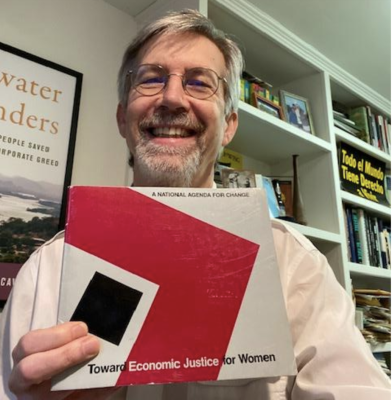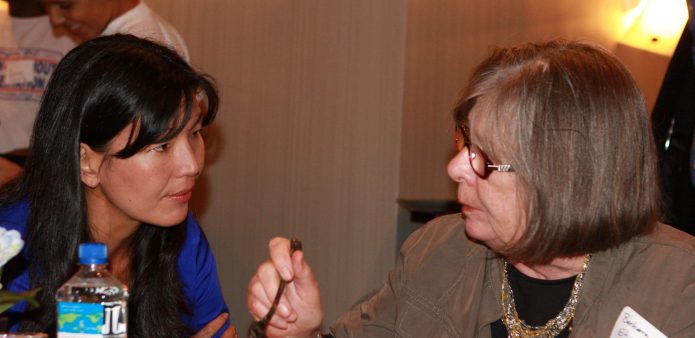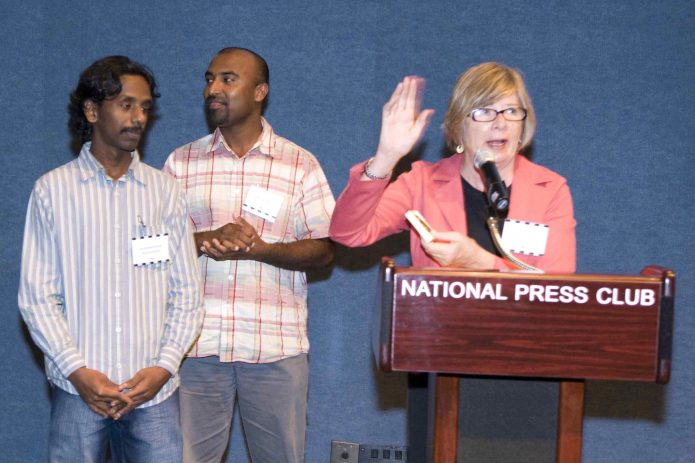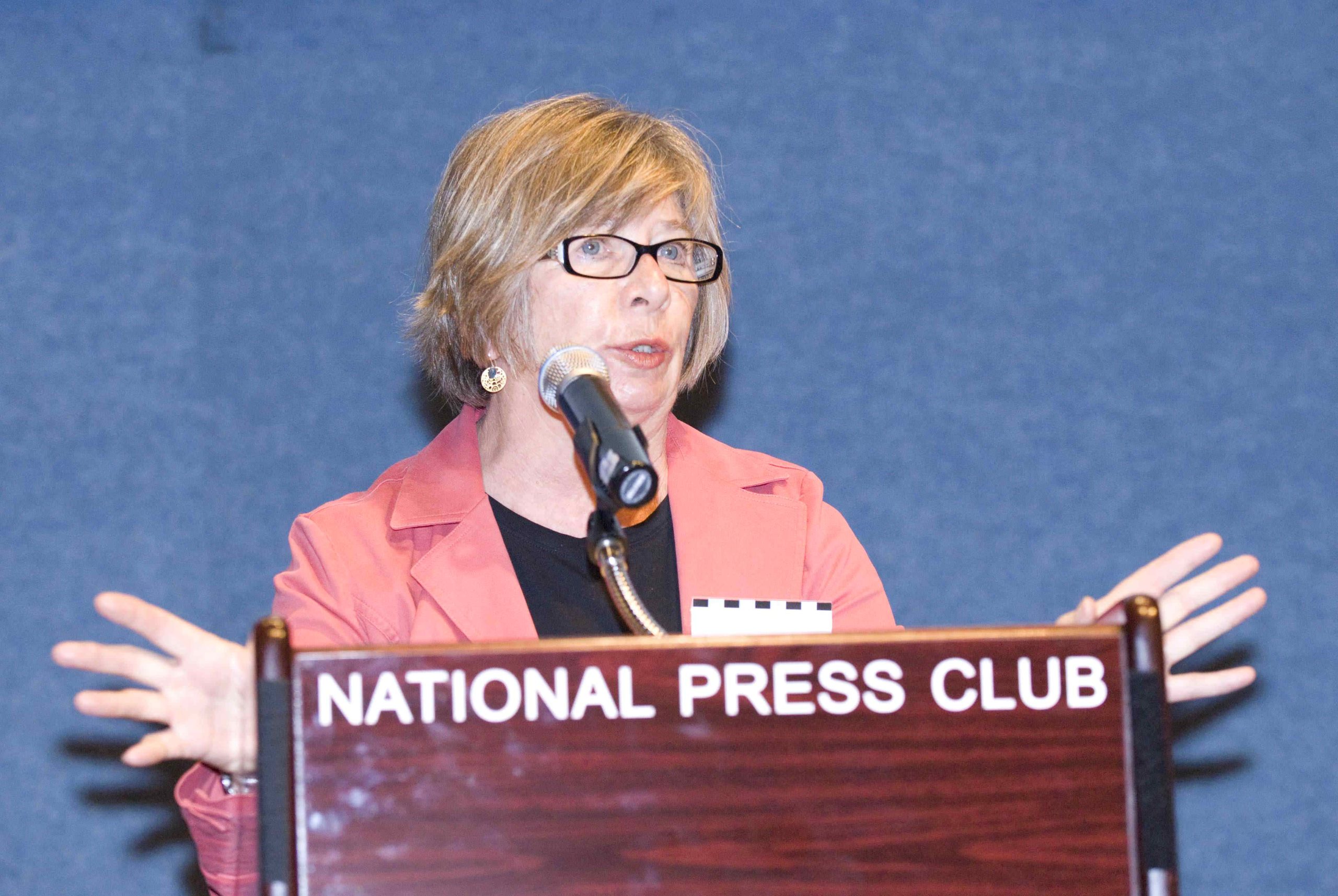The Institute for Policy Studies staff and board are mourning the loss of Barbara Ehrenreich, a fiercely committed progressive feminist who wielded her pen and sarcastic wit to expose injustices and spur action for change.
Barbara died on September 1 at age 81.

IPS Senior Advisor John Cavanagh, with Barbara Ehrenreich’s 1985 publication on a women’s economic agenda.
For more than 40 years, Barbara kept our IPS family learning and laughing. As a staff member in the 1980s, she shared an office with longtime IPS Director John Cavanagh and gave him an education in feminism. In between writing books and essays, she pulled together progressive women leaders in a working group that published A National Agenda for Change: Toward Economic Justice for Women in 1985. John still keeps a copy in his office.
For Tope Folarin, who served as IPS Board Chair before taking over as Executive Director in 2021, Barbara was also an important mentor and dear friend. After Barbara became Vice Chair of the IPS board, she was never shy about sharing her strong views with both of us about how to make our work more strategic. We took those views seriously.
Barbara was an intellectual giant, a staunch supporter of progressive movements in the U.S. and abroad, and an immensely talented writer who astutely diagnosed the problems of our times and proposed practical, commonsense solutions.
And in addition to her all-around brilliance, she had an incredible generosity of spirit. John can’t recall a single time in his four decades of friendship with Barbara when she turned down a request to write a book foreword, a blurb, or join activist meetings.
Those types of requests multiplied after the publication of her 2001 book Nickel and Dimed: On (Not) Getting By in America. Based on her “undercover” experiences as a restaurant server, cleaner, nursing home aide, and Walmart employee, the book sold more than 1.5 million copies and smashed prevalent myths about the poor.
IPS Global Economy Director Sarah Anderson remembers a bookstore event back then where an audience member asked Barbara how she managed to fool her co-workers into believing that she was actually poor like them.
“Surely,” the person said, “you must speak differently than they do.”
“Yes, I do,” Barbara replied. “I swear a lot more.”
Barbara was a hero to many in the working class and she never hesitated when we asked her to step up and help our allies. Ai-jen Poo of the National Domestic Workers Alliance called up about a dozen years ago and asked if IPS could approach Barbara about going to Albany to testify in support of the New York Domestic Worker Bill of Rights. She quickly agreed, and the legislation became the first of its kind in the nation.

Ai-jen Poo and Barbara Ehrenreich, Institute for Policy Studies 50th anniversary, 2013.
In 2008, IPS asked Barbara to present our annual Letelier-Moffitt Human Rights Award to the Indian Workers Congress, a group of guest workers who’d marched from New Orleans to Washington, DC to protest abysmal conditions in post-Katrina reconstruction labor camps. Barbara expressed sincere shame at how these workers had been treated in the richest country in the world.
“I’ve had enough bylines of my own,” Barbara would often say during the last couple of decades of her career. “Now I want to help other people get their voices heard.”
She patiently mentored IPS writers, and after the 2008 financial crash, she began exploring the idea of helping unemployed and low-income writers get their work funded and published. This became the Economic Hardship Reporting Project, which was officially launched in 2012 as an IPS initiative. Now an independent project, EHRP funds and co-publishes written work and other media about poverty and inequality in mainstream media outlets. Often produced by people who are themselves experiencing financial hardship, these works have received numerous awards.
“The worlds of journalism, labor, and literature have suffered an immense loss with Barbara Ehrenreich’s death,” said Economic Hardship Reporting Project Executive Director Alissa Quart. “She was incorruptible and irreplaceable. I am personally gutted to lose a close collaborator and dear friend. As Barbara once wrote, ‘In America, only the rich can afford to write about poverty.’ I will keep fighting to ensure this is not the case.”

Barbara Ehreneich presents at the Letelier-Moffitt Human Rights Awards, Washington, DC, October 2008.
Barbara also supported class-conscious journalism as a member of the editorial board of The Nation. Bob Borosage, who served with Barbara on both the IPS and Nation boards, describes her as “a rare combination — a public scholar who combined a passionate commitment to justice with a staunchly independent mind, a writer of penetrating insight and sardonic humor, a political activist who probed the far corners of our culture, a beloved colleague who didn’t suffer fools gladly.”
Fellow IPS board member Andy Shallal described Barbara as having a wit that “pierced through the din of intellectual malaise and redefined the role of the public scholar.”
IPS Criminalization of Race and Poverty Project Director Karen Dolan could barely believe her good fortune when she got the opportunity to work closely with Barbara after “devouring” her books as a philosophy student.
“Her philosophy and ideals were integral to forming so much of my own political philosophy,” Dolan said. “Being her mentee, colleague, and friend has been one of the great honors of my life.”
We who were blessed to know Barbara are all better for her presence in our lives, and we will miss her immensely. We do know that her legacy will live on in the many writers she has coached, her more than 20 books and countless essays, the millions of minds she’s opened, and her beloved children and grandchildren.
“I know I’m supposed to say how humbled I am,” Barbara said in 2018 after finding out that she would soon be receiving an award from the Dutch royal family at their palace in Amsterdam. “That’s what you’re supposed to say when your work is finally recognized and applauded. But I’m not going to say that. I’m proud.”
